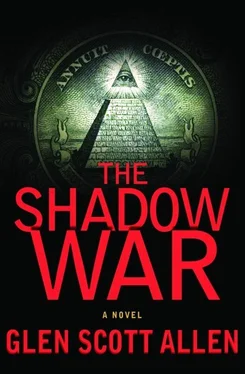Glen Allen - The shadow war
Здесь есть возможность читать онлайн «Glen Allen - The shadow war» весь текст электронной книги совершенно бесплатно (целиком полную версию без сокращений). В некоторых случаях можно слушать аудио, скачать через торрент в формате fb2 и присутствует краткое содержание. Жанр: Триллер, на английском языке. Описание произведения, (предисловие) а так же отзывы посетителей доступны на портале библиотеки ЛибКат.
- Название:The shadow war
- Автор:
- Жанр:
- Год:неизвестен
- ISBN:нет данных
- Рейтинг книги:5 / 5. Голосов: 1
-
Избранное:Добавить в избранное
- Отзывы:
-
Ваша оценка:
- 100
- 1
- 2
- 3
- 4
- 5
The shadow war: краткое содержание, описание и аннотация
Предлагаем к чтению аннотацию, описание, краткое содержание или предисловие (зависит от того, что написал сам автор книги «The shadow war»). Если вы не нашли необходимую информацию о книге — напишите в комментариях, мы постараемся отыскать её.
The shadow war — читать онлайн бесплатно полную книгу (весь текст) целиком
Ниже представлен текст книги, разбитый по страницам. Система сохранения места последней прочитанной страницы, позволяет с удобством читать онлайн бесплатно книгу «The shadow war», без необходимости каждый раз заново искать на чём Вы остановились. Поставьте закладку, и сможете в любой момент перейти на страницу, на которой закончили чтение.
Интервал:
Закладка:
"For now?"
"He also said, as I expected, that, what with Edith's fatal encounter, there was simply no way he could keep Dr. Fletcher's death from being investigated by the local police." He looked intent. "He's in an absolute panic about how all this will affect that new contract, the one Montrose negotiated. He's afraid to expose the Foundation to too much scrutiny, but equally terrified of being accused of covering up. He's in a very neat dilemma. And," Wolfe raised a finger for emphasis, "that's a dilemma I believe we can exploit. Depending, of course," and he nodded toward the books in Benjamin's lap, "what you discovered in the library."
"Oh." Benjamin looked down at the books. "I hardly know where to begin."
Wolfe interrupted him by standing up. "That sounds as though I'm in for a bit of a lecture."
He walked over to his briefcase leaning in the corner, opened it, and extracted a half-empty bottle of scotch and two empty glasses. He carried them back to the table, set the glasses down, and half filled both of them with the amber liquid.
"And now," Wolfe said, sitting back down and crossing his legs, making himself comfortable, "why don't you begin with your extraordinary claim that Morris's hoax is itself a hoax."
Benjamin's eyes sparkled. "I was right. Let me show you what I went to the library for."
Benjamin opened the books then placed them side by side.
"Here, look," he said.
Wolfe leaned over so he could read the pages Benjamin was pointing out. On the opposing pages, set next to each other, appeared the following text:
Wolfe spent a few minutes looking over the two passages. Finally, he said, "They're both from Revelation, yes?"
"Yes, just as Seaton said. Revelations six, verses twelve through seventeen, to be exact."
Wolfe looked up at him. "They're almost identical."
" Almost, " said Benjamin. "That one on the right, that's from the King James Bible. It's the phrasing most people recognize. And the one in Seaton's hoax diary."
"And the other one?" Wolfe asked.
"Ah," Benjamin said, apparently very pleased with himself. " That's the Geneva Bible."
"Geneva Bible?"
"In 1553, when Mary Tudor, who was a devout Catholic, became Queen of England she banned the printing of the Protestant version of the Bible. So two of the leading Protestant scholars of the day, William Whittingham and Anthony Gilby, fled to Europe-to Geneva, actually-and started work on their own Bible. They wanted to produce one free of any 'Catholic taint.' They used original Greek and Hebrew texts to produce their Bible, and it was considered the most accurate translation of its time. And it came to be known as the Geneva Bible."
"Well and good," interrupted Wolfe, "but how does that-"
" And it was the one all good Puritans used. It was tantamount to blasphemy for a Puritan to use the King James Version. Let alone," and he gave a significant look to Wolfe, "to quote from it."
"And the quote in the front of Morris's diary…"
"Is from the King James Version. The Reverend Harlan P. Bainbridge, the most devout of devout Puritans, would certainly not have quoted from King James. He would have used the Geneva. Therefore, he didn't write that epigraph. Therefore, that's not his diary."
Benjamin sat back, quite pleased with his chain of logic; pleased enough to sip his scotch. And wince.
Wolfe looked askance at Benjamin. "But we already know Bainbridge didn't write it. Seaton told us this supposed Bainbridge diary was a hoax, so I really don't see-"
Rather than look chagrined, Benjamin smiled even more broadly.
"Because," he said, "that quote wasn't in the book I've seen."
"You've seen? What are you talking about? Where? "
"At the Library of Congress, of course." Benjamin took another drink, wondered whether he was developing a taste for scotch.
"It was soon after I arrived at the library. They had me down in the 'dungeons,' where they keep stuff that hasn't been cataloged yet. There was a crate with a dozen or so books and manuscripts, all of them old. There was no label on the crate, no identifying cards with the books. Which actually is more common than you'd expect. The library has so much material, there are thousands of documents they haven't properly identified yet.
"Anyway," Benjamin continued, "there was one book in that crate, without a cover, that struck me as something that ought to be in the preservation room. And it was clear there had once been a block of lines on that page, an epigraph; but over the years it had worn or been eaten away. The only readable line of text was underneath the quote. And guess what it said?" Benjamin was rather enjoying teasing Wolfe, now that he was the one with the answers.
But Wolfe was up to the question. "R six-twelve HPB?" he asked.
Benjamin looked a little disappointed, but he recovered quickly. "Yes, exactly. The attribution was still readable. When the forgers created the fake diary, they tried to make it as similar to the real one as possible. But with this quote, all they had to go on was chapter and verse, and as a consequence-"
"They quoted from the wrong Bible," finished Wolfe, nodding. "Very neatly reasoned."
"And the very presence of that same attribution in the book I saw means there was a real Bainbridge diary and somehow it wound up in the Library of Congress."
Wolfe pondered for a moment. "So the real diary is discovered at the Foundation during the excavations in the twenties, but for some reason we don't yet know the Foundation doesn't want it made public. They have a fake diary constructed, create the story of a hoax, and the whole episode is forgotten." He thought this over for a moment. "But how on earth did the diary get from the Morris Estate to the Library of Congress's basement?"
"I've been thinking about that, too," said Benjamin. "Remember the fire Seaton told us about? He said they had other books to be donated to the library, crated and ready to be shipped. When that fake diary was created, the original was probably put away somewhere safe. Probably the same safe place as the collection was put during the fire. And afterwards, in the confusion…"
"The real diary was sent off to the Library of Congress, to fifty years of obscurity." Wolfe laughed. "Still, that doesn't tell us why the Foundation, or the Morrises, whoever is behind this, needed a fake diary in the first place."
"That I cannot answer," said Benjamin. He decided it was time for his next revelation.
"I went to the library to get the two Bibles. While I was there, the librarian asked if we were done with the books Jeremy had checked out. She was particularly interested in the one by Warren Ginsburg. She said it was quite valuable, and she was eager to get it back where it belonged, in the rare books collection-especially as it had been missing all those years."
"Missing?"
"Until Jeremy found it, rooting around for books about King Philip's War. Apparently it had been filed there, in the Ws, probably for Wampanoag." He laughed, but Wolfe didn't, so he hurried on. "She said it was particularly valuable because, according to the official Foundation history, Ginsburg had been commissioned to write it to commemorate the discovery of the Bainbridge diary. That's why he was here. "
"But then," Wolfe's eyes narrowed, "Ginsburg had to have seen the diary. The real diary. Was there any mention of it in his book?"
Benjamin shook his head. "No. As I said, the book was… strange, disconnected… as if whole sections of it had been lifted out. It's especially… sinister, given what happened to him and his lover, Bayne."
"Who the hell is Bayne?"
"Oh that's right, I hadn't had a chance to tell you. According to Stoltz, Ginsburg and Bayne-Bayne painted that extraordinary mural in the foyer-were lovers. And their affair ended with Ginsburg murdering Bayne, and then committing suicide."
Читать дальшеИнтервал:
Закладка:
Похожие книги на «The shadow war»
Представляем Вашему вниманию похожие книги на «The shadow war» списком для выбора. Мы отобрали схожую по названию и смыслу литературу в надежде предоставить читателям больше вариантов отыскать новые, интересные, ещё непрочитанные произведения.
Обсуждение, отзывы о книге «The shadow war» и просто собственные мнения читателей. Оставьте ваши комментарии, напишите, что Вы думаете о произведении, его смысле или главных героях. Укажите что конкретно понравилось, а что нет, и почему Вы так считаете.












